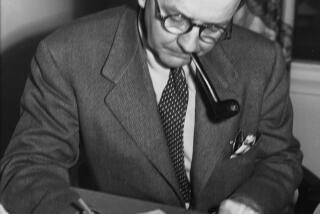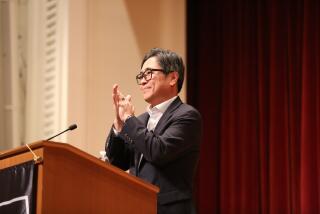Poems of War--and Poet Was There
S oldiers
When you look
The horizon
Rocks, sand
Can be anywhere.
Without a face,
A voice
To give you a clue
It could be
Any land
You came to
Die in.
John Harrell is a professional soldier. It is a destiny that haunts him, shadows him, shakes his soul. He is proud.
He is a poet.
âIt was very painful to write those poems,â he says. âA lot of those are very private.â
John Harrell looks at his hands, swaddling a cup of coffee, black. There is hesitation in his voice. He looks at me, across a coffee shopâs Formica table, through bifocals. He preferred to meet here. His home, with its mementos, photographs and wallpaper, might broadcast an unauthorized message.
But I had read John Harrellâs poetry first.
Drops
During some season
It rained
Each afternoon.
Hot steaming drops.
When the helicopters came
Drops of blood
Made beautiful mosaics
In the puddles.
Swirling, mixing
No two pools ever the same.
Some dark pomegranate
Some peppermint
Moving, changing.
Each manâs blood blending
With his friends
And foes.
John Harrell spent 23 years in the U.S. Army, active duty reserves. They did him a favor; they let him stay three years beyond the time that the rule book says youâre out.
When he left, in September of 1989, he was a lieutenant colonel. He wants to go back now. The Army, so far, has said no. Theyâre called hip pocket orders: maybe your time will come, itâs just not right now.
âI feel like Iâm not doing enough,â John Harrell says. âYou never do enough.â
He is 51 years old.
What a shot.
I read the toe tag again,
âShot by an AMERICAL sniper,
575 yds.â
Clean through and through,
Amazing.
He couldnât be more than 12.
Before now, none of John Harrellâs war poems had been published. He wrote them for his family, his friends, because he must. He did send off one poem, about the homeless, to a small literary magazine on the East Coast. They accepted it, then awarded it a small prize. It was published in December of last year.
Lee Mallory, Johnâs poetry teacher at Rancho Santiago College, told me about this first-time writing student who seemed to come into his own before his eyes. I had called Mallory out of the blue.
âWhen John did open up,â Mallory says. âIt blew me away. It makes me emotional to talk about it. . . . The writing, in his case, became cathartic. The world can only hope to learn from it.â
N V A Woman
They brought you in dying.
Damn, women donât die fighting.
What were you doing?
Why?
Two .50 caliber hits,
One in the right thigh,
One below the left knee.
Your legs were ribbons of meat.
How can a body tear so.
You had an AK-47 they said
Running, firing.
Why?
I canât let you die.
Delicate face, small,
Beautiful once.
I took your leg below the knee,
What was left.
I stopped the flow, I bound you,
I cleaned you.
Others did more.
We gave you blood
Lifeâs blood, our blood
8 pints. I never saw
Someone drink so much.
We tried, we tried so hard.
Then you left, another place
Better care, a hospital.
I felt good, you were alive.
In hours I called,
I had to know
Were you OK, what would happen to you?
âThe N V A woman,â they said
âO she died. We had to keep her in
A hallway till the American surgeries were done.â
And now, who will remember you
N V A Woman?
John Harrell was in Vietnam with the medical corps. He felt a duty to go. He is not a doctor, but he learned primitive medicine on the job.
What he saw overloads mere words. Over there, he could not allow himself to feel. It is only now that his poetry of war is spilling out.
âI abhor war,â he says. âI hate it. It is an abomination. It brings out the worst in people.â
Yet Harrell says his poems do not clang anti-war. He did not write them as such. He wrote them, he says, to help people understand what war is. If they should ever earn money, he will donate it to someplace else. He would like them to do good.
âI know what it is like over there,â Harrell says. He is talking about the war in the Persian Gulf.
âThey are going to be faced with the same problems that we were. They are professional colleagues. It is OK to abhor war, but to be a professional soldier.â
John Harrell wants so very much to be there. He reminds me that he is very good at his job. A professional soldier, with expertise. But he would rather be remembered, he says, as something else.
âA poet.â The words catch in his throat.
President Bush asked the nation earlier this month to set aside a Sunday to pray. John Harrell offers a prayer of his own.
The Prayer
I pray that as I stand
In this foreign land
I know my enemy
As my brother.
I know that his faith, like mine
Is true to his God,
His family, his home.
That he is there because he too
Trusts in duty.
That someone said,
âOur cause is just.â
God I pray
When I aim to kill him
You hold my hand
True, steady.
That my shot is clean,
That he does not suffer needlessly.
We both pray
That in death
Other lives gain meaning.
That this thing we do to each other
Is not in vain,
But seals our bonds as brothers.
More to Read
Sign up for our Book Club newsletter
Get the latest news, events and more from the Los Angeles Times Book Club, and help us get L.A. reading and talking.
You may occasionally receive promotional content from the Los Angeles Times.






